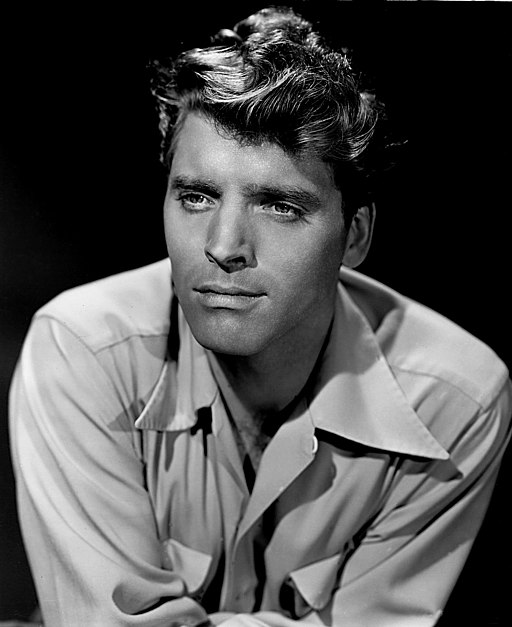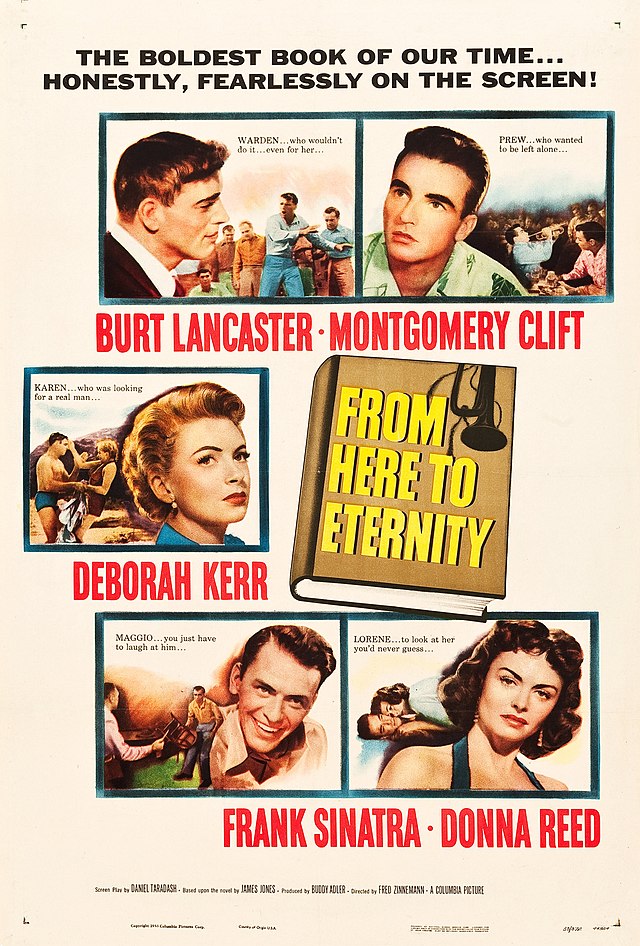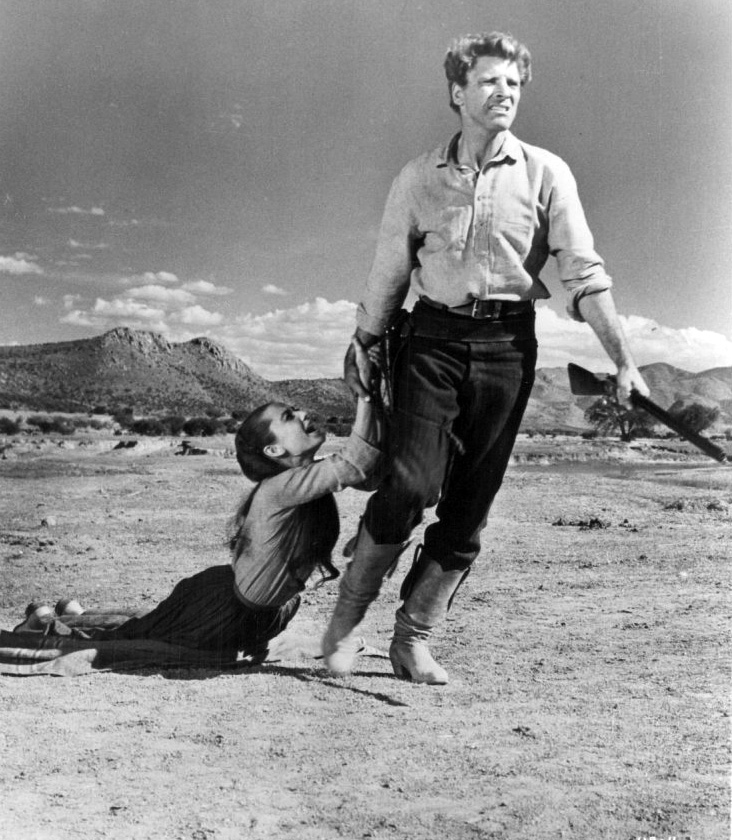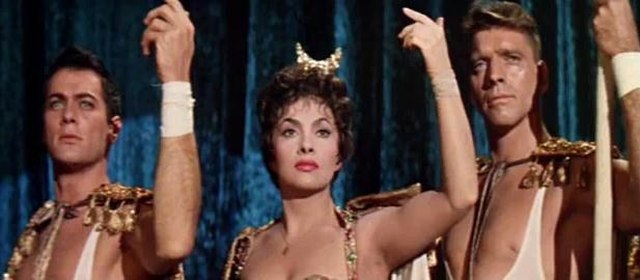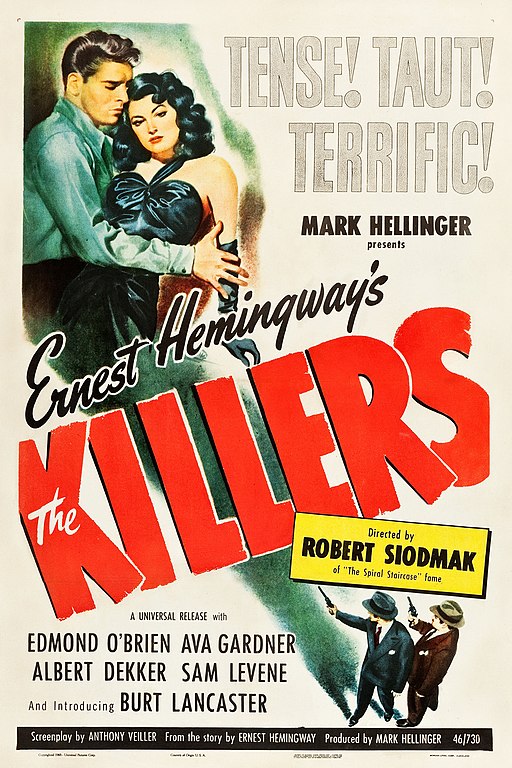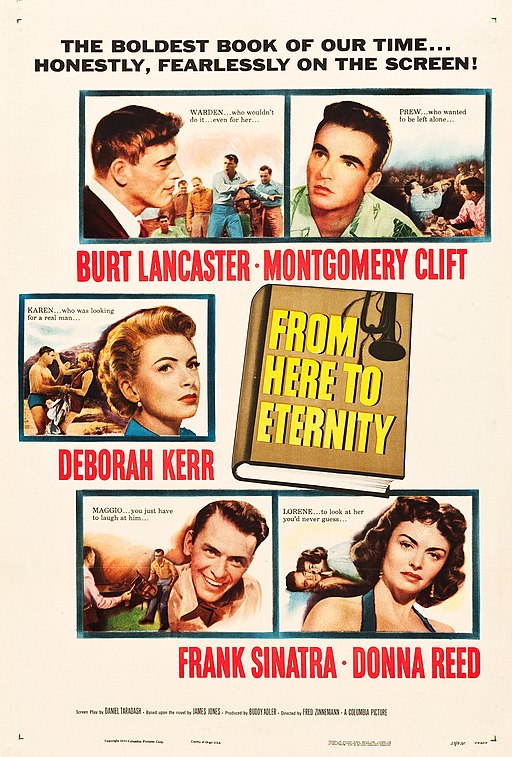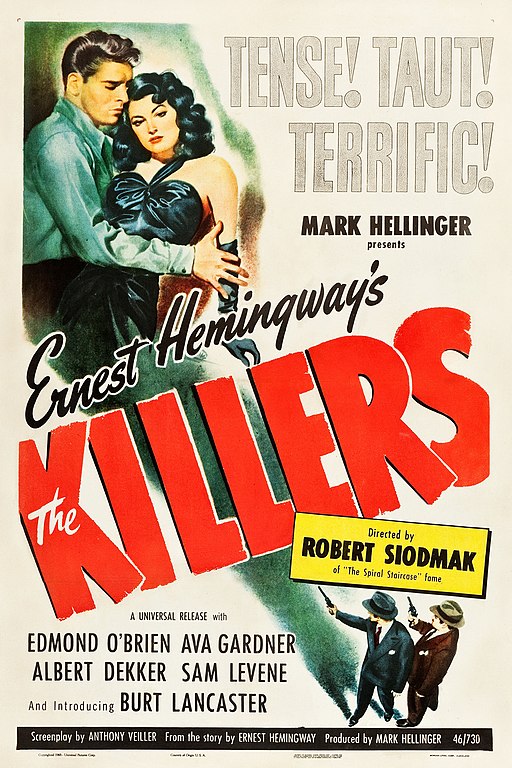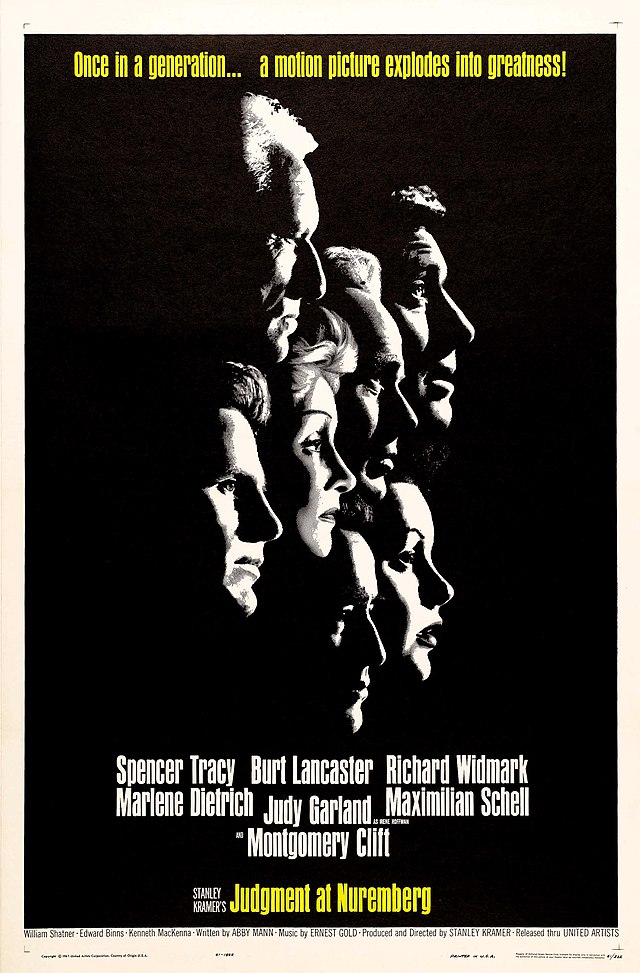Burt Lancaster
back| Full Name | Burton Stephen Lancaster |
| Stage Name | Burt Lancaster |
| Born | November 2, 1913 |
| Birthplace | Manhattan, New York City, U.S. |
| Died | October 20, 1994 |
| Buried | Westwood Village Memorial Park Cemetery, Los Angeles, CA, U.S. |
| Married to | June Ernst (1935–1946), Norma Anderson (1946–1969), and Susan Martin (1990–1994) |
| Children | Bill Lancaster, James Lancaster, Susan Lancaster, Joanna Lancaster, and Sighle Lancaster |
| Notable films | From Here to Eternity - Elmer Gantry - Birdman of Alcatraz - The Killers |
Burt Lancaster – “Mr. Muscles” of cinema
Burt Lancaster (1913-1994) was an iconic American film actor renowned for his athletic physique, deep voice, and charismatic presence. Rising to fame in the 1940s, he was first acclaimed for his role in "The Killers" (1946).
Over his career, Lancaster seamlessly transitioned between various genres, from film noirs and westerns to historical films and dramas, showcasing his versatile acting abilities.
Notable films include "From Here to Eternity" (1953), where he shared a famous beach scene with Deborah Kerr, "Elmer Gantry" (1960) for which he won an Oscar for Best Actor, and "Birdman of Alcatraz" (1962), portraying a real-life prisoner. A committed liberal, Lancaster often used his star power to advocate for civil rights and against the Vietnam War.
He was also an influential film producer, championing risky and ambitious projects, further solidifying his legacy in Hollywood. Burt Lancaster's diverse roles and enduring performances have secured his position as one of cinema's greatest actors.
Burt Lancaster, with his chiseled features, athletic physique, and captivating on-screen presence, emerged as one of the most prominent film stars of the 20th century. Born in Manhattan, New York City, he grew up in East Harlem and was a talented basketball player during his school days.
Related
Complete biography of Burt Lancaster
Birth and Family Background
Burt Lancaster was born on November 2, 1913, in Manhattan, New York City. He was the son of James Henry Lancaster, a postman, and Elizabeth Roberts. He was one of five children in the Lancaster family, which had a mixed background of Irish Protestant and English descent.
Childhood and East Harlem
Growing up in the East Harlem neighborhood, Lancaster's early life was shaped by the bustling and diverse surroundings of New York City. East Harlem during the early 20th century was a melting pot of cultures, filled with working-class families pursuing the American dream. It was here that Lancaster developed his early love for sports and physical activity.
Education
Lancaster attended DeWitt Clinton High School, a well-regarded public high school in The Bronx. The school has a rich history and is known for its notable alumni, which include many successful individuals in various fields. During his time at DeWitt Clinton, Lancaster was particularly active in sports, especially basketball and track. His athletic prowess was evident, and he became known as a standout basketball player.
The Circus and Acrobatics
Post high school, Lancaster's first venture into show business wasn't in acting but in the circus. He teamed up with his childhood friend Nick Cravat, forming the acrobatic duo "Lang and Cravat." The duo performed with circuses, and their specialty was the horizontal bars. This period of Lancaster's life honed his physical abilities and introduced him to the world of performance. While the circus venture was short-lived due to an injury Lancaster sustained, the skills he acquired would later serve him well in Hollywood, especially in roles that demanded physicality.
Transition to Acting
After his circus career and a stint in the army during World War II, Lancaster transitioned into acting. His imposing physical presence, combined with a natural charisma, quickly caught the attention of film producers. After a few theater roles, Lancaster was discovered by a talent scout, leading to his impressive film debut in "The Killers" in 1946.
Burt Lancaster's Early Film Roles and Success
"The Killers" (1946):
Lancaster's cinematic debut came in Robert Siodmak's film noir, "The Killers." He played the role of 'Swede' Andersen, a former boxer entangled in a life of crime. His performance was lauded for its depth and vulnerability. For a newcomer, it was a breakthrough role, and Lancaster's portrayal of the doomed protagonist made a lasting impression. The film's success set the stage for Lancaster's future in Hollywood.
"Brute Force" (1947):
Following the success of "The Killers," Lancaster starred in this prison drama, again displaying his capability for intense roles. Directed by Jules Dassin, the film sees Lancaster as Joe Collins, an inmate planning a revolt against a sadistic security officer. His portrayal reinforced his status as a commanding on-screen presence.
"Sorry, Wrong Number" (1948):
In this noir thriller, Lancaster co-starred alongside Barbara Stanwyck. He played the role of Henry Stevenson, revealing a more sinister side to his acting range. The film's narrative structure and Lancaster's performance were both highly praised.
"Criss Cross" (1949):
Reuniting with director Robert Siodmak, Lancaster played the part of Steve Thompson, a man involved in a heist that goes terribly wrong. The film's intricate plot and Lancaster's compelling performance further solidified his reputation as a film noir leading man.
"Rope of Sand" (1949):
Lancaster ventured into the adventure genre with this film, taking on the role of Mike Davis, a hunter battling both nature and adversaries in the African desert. This role allowed Lancaster to showcase both his physicality and acting chops.
"Jim Thorpe – All-American" (1951):
This biographical film about the famed athlete Jim Thorpe allowed Lancaster to tap into his athletic background. His portrayal of Thorpe was well-received, demonstrating his versatility as an actor who could tackle a range of roles.
"Come Back, Little Sheba" (1952):
In this drama, Lancaster took on a more subdued role opposite Shirley Booth. His portrayal of 'Doc' Delaney, a recovering alcoholic, was a departure from his earlier, more physically-demanding roles, proving that he could master the nuances of character-driven dramas.
By the early 1950s, Burt Lancaster had already established himself as a leading man in Hollywood.
Some of his most iconic roles include the tough Sergeant Warden in "From Here to Eternity" (1953), which earned him an Oscar nomination, and the charismatic but morally ambiguous title character in "Elmer Gantry" (1960), for which he won the Academy Award for Best Actor.
The 1950s and 1960s are often considered the zenith of Burt Lancaster's career.
Video Biography of Burt Lancaster:
Burt Lancaster's Prime in the 1950s and 1960s
"From Here to Eternity" (1953):
One of Lancaster's most iconic roles came in this drama set against the backdrop of the Pearl Harbor attack. He played First Sergeant Milton Warden, engaging in a passionate affair with Karen Holmes, played by Deborah Kerr. The film's beach scene with Lancaster and Kerr remains one of the most celebrated moments in cinema. Lancaster's nuanced performance earned him an Academy Award nomination for Best Actor.
"The Rose Tattoo" (1955):
Lancaster played alongside Anna Magnani in this adaptation of Tennessee Williams' play. His role as Alvaro Mangiacavallo showcased his comedic side, a departure from his more intense roles.
"Trapeze" (1956):
Returning to his acrobatic roots, Lancaster portrayed a former trapeze artist teaching a young protégé in this circus-themed drama. The film was a commercial success, further bolstering Lancaster's star power.
"Sweet Smell of Success" (1957):
In a dark turn, Lancaster portrayed J.J. Hunsecker, a ruthless newspaper columnist. His chilling performance in this film noir is often cited as one of his best, revealing the depths of his versatility.
"Separate Tables" (1958):
In this ensemble drama, Lancaster took on a more restrained role, showcasing his ability to shine even amidst a cast of standout performers, which included Deborah Kerr, Rita Hayworth, and David Niven.
"Elmer Gantry" (1960):
Lancaster's portrayal of the title character, a charismatic but morally flawed salesman-turned-evangelist, is considered one of his finest performances. He won the Academy Award for Best Actor for this role, firmly cementing his status as one of Hollywood's premier actors.
"Birdman of Alcatraz" (1962):
In a stark departure from his typical roles, Lancaster played Robert Stroud, a real-life prisoner who becomes a respected ornithologist while serving a life sentence. His sensitive portrayal earned him another Oscar nomination.
"The Train" (1964):
Lancaster combined his acting prowess with his physicality in this World War II drama, playing a French Resistance fighter trying to stop a Nazi colonel from taking art treasures out of France.
"The Professionals" (1966):
In this western adventure, Lancaster played the explosives expert Dolworth, further proving his versatility in different genres.
"The Swimmer" (1968):
In a surreal drama based on a John Cheever story, Lancaster portrayed a man who decides to swim through all the pools in his neighborhood, confronting various facets of his life along the way.
Throughout the 1950s and 1960s, Burt Lancaster proved time and again that he was more than just a leading man with good looks. His choice of diverse roles, willingness to tackle complex characters, and commitment to the craft solidified his reputation as one of the most talented and versatile actors of his generation.
Lancaster was not just content to remain in front of the camera; he also co-founded his own production company, Hecht-Hill-Lancaster, which was responsible for many successful films in the 1950s. This move allowed him greater control over his projects and showcased his interest in tackling diverse and socially relevant themes.
Off-screen, Lancaster's personal life saw its share of ups and downs. He was married three times, with his longest marriage being to Norma Anderson, which lasted over two decades and produced five children.
His brilliance in Westerns
Burt Lancaster was a versatile actor, but he had a particular flair for the Western genre. His physicality, athleticism, and charisma translated well to the rugged landscapes and intense narratives of Western films. Here's an overview of his involvement in the Western genre:
Notable Westerns
"Vera Cruz" (1954)
- Character: Joe Erin
- Description: Lancaster plays a rough-and-ready American mercenary who teams up with an ex-Confederate soldier (played by Gary Cooper) during the Mexican Revolution.
"The Kentuckian" (1955)
- Character: Elias Wakefield (Big Eli)
- Description: Lancaster plays a frontiersman leading his son from Kentucky to Texas. This film was also Lancaster's directorial debut.
"Gunfight at the O.K. Corral" (1957)
- Character: Marshal Wyatt Earp
- Description: Based on the real-life 1881 gunfight, Lancaster plays the legendary lawman Wyatt Earp alongside Kirk Douglas as Doc Holliday.
"The Hallelujah Trail" (1965)
- Character: Col. Thaddeus Gearhart
- Description: In this comedic Western, Lancaster plays a cavalry officer tasked with escorting a whiskey shipment through Indian territory.
"The Professionals" (1966)
- Character: Dolworth
- Description: A dynamic Western where Lancaster plays an explosives expert in a group of mercenaries hired to rescue a wealthy man's wife from a Mexican revolutionary.
"Valdez is Coming" (1971)
- Character: Bob Valdez
- Description: Lancaster is a town constable forced to seek justice after a wealthy rancher causes an innocent man's death.
"Ulzana's Raid" (1972)
- Character: McIntosh
- Description: Lancaster plays a seasoned scout helping an inexperienced U.S. Cavalry lieutenant track down the Apache warrior Ulzana.
"Lawman" (1971)
- Character: Bannock Town Marshal Jared Maddox
- Description: Lancaster is a lawman who is determined to bring a group of men to justice, regardless of the cost.
Character Traits and Specialties in Westerns
- Physicality: Lancaster's early career in circus acrobatics lent him a unique physical presence. This athleticism often manifested in his Western roles through dynamic action sequences.
- Moral Ambiguity: Especially in films like "Vera Cruz," Lancaster's characters weren't always straightforward heroes. They could be morally complex, sometimes blurring the line between hero and antihero.
- Authoritative Presence: Lancaster often played characters in positions of leadership or authority, like lawmen or leaders of men, showcasing his commanding screen presence.
- Depth and Nuance: Even in action-packed Westerns, Lancaster brought depth to his characters. He wasn't just a typical gunslinger but often portrayed men dealing with internal conflicts and the moral complexities of the West.
In essence, while Burt Lancaster brought versatility to all his roles, his Western characters often combined physical prowess with moral complexity, making him stand out in the genre.
Awards and nominations for Burt Lancaster
Burt Lancaster received many awards and was nominated for many of his roles.
Academy Awards (Oscars):
- 1961: Won - Best Actor in a Leading Role for "Elmer Gantry"
- 1954: Nominated - Best Actor in a Leading Role for "From Here to Eternity"
- 1982: Nominated - Best Actor in a Leading Role for "Atlantic City"
Golden Globe Awards:
- 1961: Won - Best Actor in a Motion Picture - Drama for "Elmer Gantry"
- 1982: Nominated - Best Actor in a Motion Picture - Drama for "Atlantic City"
- 1963: Nominated - Best Actor in a Motion Picture - Drama for "Birdman of Alcatraz"
- 1957: Nominated - Best Actor in a Motion Picture - Drama for "The Rainmaker"
- 1965: Nominated - Best Actor in a Motion Picture - Drama for "The Train"
BAFTA Awards:
- 1962: Won - Best Foreign Actor for "Elmer Gantry"
- 1963: Nominated - Best Foreign Actor for "Birdman of Alcatraz"
- 1966: Nominated - Best Foreign Actor for "The Train"
- 1981: Nominated - Best Actor in a Leading Role for "Atlantic City"
Berlin International Film Festival:
- 1966: Won - Silver Bear for Best Actor for "The Hallelujah Trail"
Venice Film Festival:
- 1985: Won - Volpi Cup for Best Actor for "Go Tell the Spartans"
New York Film Critics Circle Awards:
- 1980: Won - Best Actor for "Atlantic City"
National Board of Review Awards:
- 1960: Won - Best Actor for "Elmer Gantry"
Laurel Awards:
- 1961: Won - Top Male Dramatic Performance for "Elmer Gantry"
- 1959: Nominated - Top Male Action Performance for "The Devil's Disciple"
- 1960: Nominated - Top Male Dramatic Performance for "The Unforgiven"
- 1961: Nominated - Top Male Action Performance for "The Young Savages"
- 1962: Nominated - Top Male Dramatic Performance for "Birdman of Alcatraz"
- 1963: Nominated - Top Male Action Performance for "The List of Adrian Messenger"
- 1964: Nominated - Top Male Action Performance for "Seven Days in May"
While the above represents the most significant awards and nominations in major award ceremonies, Burt Lancaster was recognized in various other ceremonies and film festivals throughout his career for his outstanding contributions to cinema.
Political activism
Burt Lancaster was not just a leading actor but also an outspoken advocate for various causes, reflecting his personal beliefs and commitment to social justice.
Civil Rights
Lancaster was a strong supporter of the Civil Rights Movement. He was one of the few Hollywood stars who traveled to Washington D.C. to take part in the historic March on Washington for Jobs and Freedom in 1963, where Dr. Martin Luther King Jr. delivered his "I Have a Dream" speech.
Anti-Vietnam War
e opposed the Vietnam War and used his influence to speak out against it. Lancaster, alongside other notable figures, participated in events and campaigns that called for an end to the war.
Nuclear Disarmament
ancaster was an advocate for nuclear disarmament, and he participated in various campaigns and initiatives aimed at promoting peace and reducing the global stockpile of nuclear weapons.
Support for Progressive Candidates
Politically, Lancaster was known to support progressive candidates and causes. He publicly endorsed and campaigned for several Democratic presidential candidates who held progressive views.
Film Choices Reflecting Political Beliefs
Many of the film roles he chose, especially during the 1960s and 1970s, mirrored his political beliefs. Movies like "Judgment at Nuremberg," which tackled issues of justice post-WWII, and "Seven Days in May," which discussed the potential military takeover of the U.S. government, were in line with his personal stances.
Activism Against McCarthyism
During the 1950s, when Senator Joseph McCarthy was leading a campaign against alleged Communists in the U.S., many in Hollywood were blacklisted for their alleged or real associations with the Communist Party. Lancaster was a vocal critic of this blacklist, standing against the Hollywood studios that enforced it and in support of those who were unfairly targeted.
Support for AIDS Awareness
Later in his life, during the 1980s, Lancaster used his platform to raise awareness about AIDS, especially after the death of his close friend, Rock Hudson.
In all these instances, Lancaster's political activism reflected his deep personal convictions. He was willing to risk his popularity and his career for what he believed in, making him one of the few Hollywood stars of his era to be so outwardly political.
Burt Lancaster’s spouses
Burt Lancaster was married three times over the course of his life.
June Ernst:
- Married: 1935
- Divorced: 1946
- Details: Lancaster's first marriage was to June Ernst, a union that lasted for about 11 years. The marriage took place before Lancaster achieved his major breakthrough in Hollywood. The reasons for their divorce are not widely publicized, but given that it happened around the time Lancaster's acting career took off, it's possible that the pressures and demands of his newfound
fame played a role in their separation.
Norma Anderson:
- Married: 1946
- Divorced: 1969
- Details: Soon after his divorce from June Ernst, Lancaster married Norma Anderson. Their marriage spanned over two decades and produced five children: Bill, James, Susan, Joanna, and Sighle. The reasons for their divorce after 23 years of marriage remain private, but as with many Hollywood marriages, the pressures of stardom, work commitments, and public scrutiny could have contributed to the split. The 1960s, in particular, were a busy and highly successful period in Lancaster's career, which may have placed additional strain on their personal relationship.
Susan Martin:
- Married: 1990
- Remained Together Until: Lancaster's death in 1994
- Details: Late in his life, Lancaster married Susan Martin. They remained together until Lancaster's death in 1994. Not much is publicly documented about the intricacies of their relationship, but they were together during Lancaster's later years, including when he faced health challenges.
Throughout his life, Lancaster was known for his charisma and on-screen presence, but he was also a private individual when it came to his personal relationships.
Death and burial site
Burt Lancaster passed away on October 20, 1994. He died from a heart attack at the age of 80. His health had been in decline for some years leading up to his death. In 1990, Lancaster suffered a stroke that left him partly paralyzed and with impaired speech.
He is buried at the Westwood Village Memorial Park Cemetery in Los Angeles, California. This cemetery is the final resting place for many celebrities, and Lancaster's gravesite is visited by fans and admirers to this day.
Complete Overview of Burt Lancaster Movies
1940s:
- 1946: "The Killers"
- Director: Robert Siodmak
- Cast: Ava Gardner, Edmond O'Brien
- 1947: "Brute Force"
- Director: Jules Dassin
- Cast: Hume Cronyn, Charles Bickford
- 1948: "Sorry, Wrong Number"
- Director: Anatole Litvak
- Cast: Barbara Stanwyck, Ann Richards
- 1949: "Criss Cross"
- Director: Robert Siodmak
- Cast: Yvonne De Carlo, Dan Duryea
1950s:
- 1951: "Jim Thorpe – All-American"
- Director: Michael Curtiz
- Cast: Charles Bickford, Steve Cochran
- 1952: "Come Back, Little Sheba"
- Director: Daniel Mann
- Cast: Shirley Booth, Terry Moore
- 1953: "From Here to Eternity"
- Director: Fred Zinnemann
- Cast: Deborah Kerr, Frank Sinatra, Montgomery Clift
- 1955: "The Rose Tattoo"
- Director: Daniel Mann
- Cast: Anna Magnani, Marisa Pavan
- 1956: "Trapeze"
- Director: Carol Reed
- Cast: Tony Curtis, Gina Lollobrigida
- 1957: "Sweet Smell of Success"
- Director: Alexander Mackendrick
- Cast: Tony Curtis, Susan Harrison
- 1958: "Separate Tables"
- Director: Delbert Mann
- Cast: Deborah Kerr, Rita Hayworth, David Niven
1960s:
- 1960: "Elmer Gantry"
- Director: Richard Brooks
- Cast: Jean Simmons, Arthur Kennedy
- 1961: "The Young Savages"
- Director: John Frankenheimer
- Cast: Dina Merrill, Edward Andrews
- 1962: "Birdman of Alcatraz"
- Director: John Frankenheimer
- Cast: Karl Malden, Thelma Ritter
- 1963: "The Leopard"
- Director: Luchino Visconti
- Cast: Claudia Cardinale, Alain Delon
- 1964: "The Train"
- Director: John Frankenheimer
- Cast: Paul Scofield, Jeanne Moreau
- 1966: "The Professionals"
- Director: Richard Brooks
- Cast: Lee Marvin, Robert Ryan, Claudia Cardinale
- 1968: "The Swimmer"
- Director: Frank Perry, Sydney Pollack (uncredited)
- Cast: Janet Landgard, Janice Rule
- 1969: "Castle Keep"
- Director: Sydney Pollack
- Cast: Patrick O'Neal, Jean-Pierre Aumont
1970s:
- 1970: "Airport"
- Director: George Seaton
- Cast: Dean Martin, Jean Seberg, Jacqueline Bisset
- 1971: "Lawman"
- Director: Michael Winner
- Cast: Robert Ryan, Lee J. Cobb
- 1972: "Ulzana's Raid"
- Director: Robert Aldrich
- Cast: Bruce Davison, Jorge Luke
- 1973: "Scorpio"
- Director: Michael Winner
- Cast: Alain Delon, Paul Scofield
- 1974: "The Midnight Man"
- Director: Roland Kibbee, Burt Lancaster
- Cast: Susan Clark, Cameron Mitchell
- 1976: "1900" (Novecento)
- Director: Bernardo Bertolucci
- Cast: Robert De Niro, Gérard Depardieu, Dominique Sanda
- 1977: "The Cassandra Crossing"
- Director: George P. Cosmatos
- Cast: Sophia Loren, Richard Harris
- 1978: "Go Tell the Spartans"
- Director: Ted Post
- Cast: Craig Wasson, Jonathan Goldsmith
- 1979: "Zulu Dawn"
- Director: Douglas Hickox
- Cast: Peter O'Toole, John Mills, Simon Ward
1980s:
- 1980: "Atlantic City"
- Director: Louis Malle
- Cast: Susan Sarandon, Kate Reid
- 1981: "Cattle Annie and Little Britches"
- Director: Lamont Johnson
- Cast: Diane Lane, Amanda Plummer
- 1983: "Local Hero"
- Director: Bill Forsyth
- Cast: Peter Riegert, Denis Lawson
- 1983: "The Osterman Weekend"
- Director: Sam Peckinpah
- Cast: Rutger Hauer, John Hurt
- 1985: "Little Treasure"
- Director: Alan Sharp
- Cast: Margot Kidder, Ted Danson
- 1986: "Tough Guys"
- Director: Jeff Kanew
- Cast: Kirk Douglas, Eli Wallach
- 1989: "Field of Dreams"
- Director: Phil Alden Robinson
- Cast: Kevin Costner, James Earl Jones
1990s:
- 1990: "The Phantom of the Opera"
- Director: Tony Richardson
- Cast: Teri Polo, Charles Dance
- 1991: "Separate But Equal" (TV Mini-Series)
- Director: George Stevens Jr.
- Cast: Sidney Poitier, Richard Kiley
Quotes from Burt Lancaster
Burt Lancaster was known for several memorable quotes, both from his films and personal life.
- From the film "Field of Dreams" (1989): "Is this heaven?" – a line his character, Dr. Archibald 'Moonlight' Graham, says in the iconic baseball movie.
- Regarding his career choices: "I woke up one day a star. It was terrifying. So I went out and bought some suspenders."
- On his approach to roles: "I don't think anyone can tell you what it is that makes you a star."
- On his own image: "We're all forgotten sooner or later. But not films. That's all the memorial we should need or hope for."
- On Hollywood: "Hollywood is a jungle. To work in it, you must have the patience of a saint, the endurance of a camel... and claws sharper than a great white shark!"
- About acting: "I've always believed that acting is instinct to start with; you either have it or you don't... My theory is if you can do it, if you really have it inside you, that's all that's necessary."
Burt Lancaster's Legacy:
Burt Lancaster's impact on the film industry is undeniable. With a career that spanned over four decades, he left behind a legacy as one of Hollywood's most versatile, charismatic, and enduring leading men.
- Versatility as an Actor: Burt Lancaster was known for his ability to play a wide range of characters. From the tough roles in films like "Brute Force" and "The Killers" to more sensitive and complex roles in "Birdman of Alcatraz" and "Elmer Gantry", Lancaster showcased his versatility, proving that he was not just a physically impressive presence but also a talented actor.
- Production Influence: Lancaster also made a mark as a producer, co-founding his own production company, Hecht-Hill-Lancaster, in the 1950s. This allowed him to have a significant influence over his films, ensuring that many of them reflected his personal and sometimes unconventional tastes.
- Political Activism: Off the screen, Lancaster was known for his liberal political beliefs and was an active supporter of various civil rights movements, especially in the 1960s. His activism gave him a reputation as one of Hollywood's most outspoken liberals, and he used his status to bring attention to various causes.
- Influence on Future Generations: Many actors and filmmakers who came after Lancaster have cited him as a significant influence. His dedication to his craft, combined with his physical prowess and commitment to pushing boundaries, has inspired countless individuals in the entertainment industry.
- Awards and Recognition: Lancaster's legacy has been cemented with numerous awards throughout and after his career. His Oscar win for "Elmer Gantry" stands out, but he also received various international honors and film festival awards, recognizing his contribution to cinema globally.
- Enduring Filmography: Lancaster's films remain popular among audiences and critics alike. Movies like "From Here to Eternity," "The Sweet Smell of Success," and "Atlantic City" are considered classics and continue to be studied in film schools.
In sum, Burt Lancaster's legacy lies not only in his memorable film roles but also in his influence on the industry, his dedication to political activism, and his enduring impact on future generations of actors and filmmakers.

